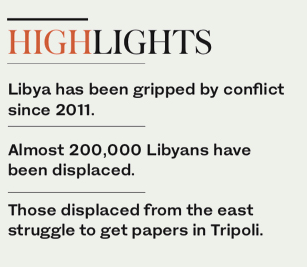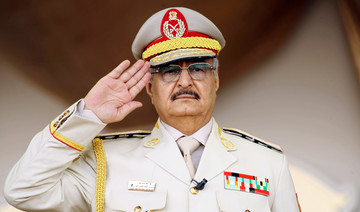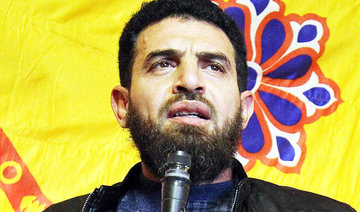TRIPOLI: With two brothers in jail, the family house gone and her papers lost in the battle for Benghazi, Fatma is finding it hard to restart her life at the other end of Libya, but impossible to imagine going back.
The 26-year-old is one of about 185,000 Libyans the UN has recorded as displaced by the turmoil in the North African country. She is living in the capital Tripoli and barred from her eastern home city, where a rival administration holds sway.
Former Benghazi residents are not the only ones driven from their homes: Fighting turned the 6 million- strong country into a patchwork of rival fiefdoms after Muammar Qaddafi was ousted by a pro-democracy uprising in 2011.
But they make up a large proportion of the displaced and their fate is central to the future stability of Libya and the wider region, where Al Qaeda and Daesh have exploited political alienation.
Displaced
The Benghazi displaced consist of radical and more moderate Islamists and other opponents of Khalifa Haftar, a commander who controls much of eastern Libya and has an eye on the rest. They have all been labelled terrorists by Haftar and his supporters, complicating the reconciliation the UN hopes to advance by helping Libya hold elections this year.
“My family was in opposition to Haftar so it got too dangerous for us,” Fatma said in phone interview, asking, like others interviewed, for her first name only, to be used fearing reprisals.
 Haftar turned against Qaddafi, along with extremists and allied fighters, and then, once Qaddafi was gone, expelled his former allies, some of whom viewed him as a throwback to one-man rule.
Haftar turned against Qaddafi, along with extremists and allied fighters, and then, once Qaddafi was gone, expelled his former allies, some of whom viewed him as a throwback to one-man rule.
More than 100,000 people were displaced, according to UN estimates, in fighting between the former allies that broke out in 2014 and destroyed entire neighborhoods before it ended last July, when Haftar declared victory.
He now leads a government in competition with a UN-backed administration in Tripoli and is weighing whether to run for president if and when elections are held.
He is backed by Egyptian President Abdel Fattah El-Sisi, who also has military roots. El-Sisi has cracked down on extremists, who he brands terrorists, and faces growing attacks, claimed by Daesh, on soldiers and civilians in Sinai.
Night flight
Fatma fled in 2014 with her parents and siblings, driving through the night to Misrata, a city in western Libya about 800 km (500 miles) away which supported the extremists opposing Haftar and where some Benghazi businesspeople have roots.
One of her brothers was arrested because he had been a member of Ansar Al-Shariya, an Islamist militant group that fought Haftar and which Washington says was behind the 2012 Benghazi attack that killed the US ambassador. Many Ansar Shariya members ended up with Daesh but the battle for Benghazi also drew in non-extremists or more moderate forces opposed to Haftar. Western diplomats say this group might get radicalized if denied the right to return.
“If the Benghazi displaced don’t find a ‘political home’, then they will become a source of new dissent,” one diplomat said.
Haftar has presented himself to foreign powers as a bulwark against terrorism and is popular among many in eastern Libya who credit him with ending a rise in extremism.
His opponents accuse him of resurrecting an authoritarian state in the east, where he controls the OPEC member’s key oil-export ports.
Fatma’s family rushed to sell her house to a neighbor; the Tripoli-based council of displaced from Benghazi says other homes were taken by the families of forces linked to Haftar’s Libyan National Army (LNA).
Reconciliation?
Haftar has threatened severe consequences for refusing to return houses to their owners, but critics say he is unable to control all LNA forces, a mixture of soldiers, tribesmen and youths who joined up.
“I don’t have a problem with Haftar but I fear going back because in Benghazi everyone who left in 2014 is seen as ‘Daesh’,” said an oil engineer called Mahmoud who hails from the same tribe as Haftar.
He did not join extremists but left the city for Tripoli in 2014 when fighting hit his district. “My house got destroyed by an air strike and I also have an apartment which some people have occupied.”
The UN has begun meetings to bring together rival communities in various parts of Libya and pave the way for presidential and parliamentary votes it hopes will be held soon.
Tarek Orafi, head of the Benghazi municipal council replaced by Haftar by a military governor, said only a few families who fled the city in 2014 had gone back.
A UN-led group of aid agencies involved in protection of civilians in Libya put the number of people still displaced from Benghazi inside Libya at 27,000 but Orafi said others had gone abroad like Sagizly, many to Turkey.
The council has registered some 13,000 displaced families but its members said the number was higher, since many people did not want to add their names, fearing reprisals.
Reuters did meet some Benghazi residents living in Tripoli who travel home without getting questioned, however.
Orafi said those arriving in western Libya find themselves in legal limbo. The east refuses to send documents such as birth certificates, often citing ongoing security investigations, and officials in western Libya will not issue new ones without them.















